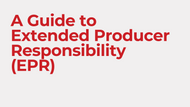A Guide to Extended Producer Responsibility (EPR)
1st May 2025
A Guide to Extended Producer Responsibility (EPR)
Extended Producer Responsibility (EPR) is legislation introduced to improve packaging waste management in the UK. Included as part of the UK Government’s Net Zero strategy, which enshrines the commitment to become carbon neutral by 2050, this legislation means that packaging producers pay the full cost of managing packaging once it becomes waste.
This new legislation updates the current system to encourage use of recycled and recyclable materials in packaging, improve recycling facilities in the UK, increase the rate of recycling and reuse and reduce litter.
There are a number of changes which mean obligated producers are now required to pay the full costs of packaging throughout a product lifecycle. Previously these costs fell on local government, either completely or partially.
To help our customers, we’ve put together a guide, along with links to the Government website. These regulations are being updated regularly so do check your own professional legal advice, as there are penalties for non-compliance.
Businesses affected by EPR
If your organisation handles, uses or supplies packaging, it could be affected. This is if your business:
- has a turnover of £1 million or more
- is responsible for 25 tonnes or more of packaging per year
- carries out any of the packaging activities defined in the legislation
Please note, charities are not included in EPR.
Businesses are split into ‘small’ and ‘large’ for the purposes of the legislation and have different requirements.
Small organisations:
- have an annual turnover between £1 million and £2 million and supply or import more than 25 tonnes of packaging in the UK
- have an annual turnover over £1 million and supply or import between 25 tonnes and 50 tonnes of packaging in the UK
Large organisations:
- have an annual turnover of £2 million+ and supply or import more than 50 tonnes of packaging in the UK
The definition of ‘packaging activities’ is comprehensive
All companies using packaging are included who:
- supply packaged goods to the UK market under their own brand
- place goods into packaging
- import products in packaging
- own an online marketplace
- hire or loan out reusable packaging
- supply empty packaging
Packaging is categorised as primary, secondary, tertiary or shipment:
- Primary – directly holds the item
- Secondary – holds multiple units
- Tertiary – is used for shipping, often protecting Secondary packaging
- Shipment – specifically used for sending products to consumers, eg for ecommerce
Packaging type data is also required for large organisations:
Large producers need to report whether the packaging:
- is household or non-household
- commonly ends up in public bins
- is a household or non-household drinks container
- is reusable
- becomes self-managed waste
Regulatory timelines
The legislation has been in development for some time and came into force on 1st January 2025. However obligated organisations have been required to submit reports before this date and are subject to penalties if these requirements have not been met. Organisations have to contact their environmental regulator if the submission deadline has been missed.
Large producers are required to collect and submit packaging data every six months
2024 data - the submission deadlines were:
|
Data collected |
Submission deadline |
|
1st April to 30th June 2024 |
1st October 2024 |
|
1st July and 31st December 2024 |
1st April 2025 |
2025 data - the submission deadlines are:
|
Data collected |
Submission deadline |
|
1st January to 30th June |
1st October 2025 |
Small producers are required to collect and submit packaging data annually
- 2024 data- the submission deadline was 1st April 2025
- 2025 data - the submission deadline is 1st April 2026
The data to be collected
The data to be collected includes: packaging activity data, eg whether the organisation is a brand using packaging or supplying packaging to be used by another organisation; packaging class data, eg whether packaging is primary, secondary, shipment or tertiary; packaging type data, eg whether household or non-household and the material and weight. Large organisations must also collect information about the recyclability of some packaging.
Obligated large companies who supply household packaging must assess the recyclability and report the results. This is done through the recyclability assessment methodology (RAM) which allocates ratings - red, amber or green. This rating affects the disposal fee that will be charged for that packaging.
Overall corrugated cardboard without any coating is rated Green.
Organisations may also need to report nation data. This is information about which nation in the UK packaging is supplied in and which nation in the UK packaging is discarded in.
Fees to be paid
Companies affected may need to pay a waste management fee and pay for packaging waste recycling notes (PRNs). They may also need to pay scheme administrator costs and a charge to the environmental regulator.
How ASC Direct can help
EPR is designed to reward using the minimal amount of packaging needed with the most sustainable material. ASC Direct specialises in supplying right sized packaging to minimise your material use with corrugated, the most sustainable packaging material. Speak to one of our friendly, knowledgeable team who will make sure you get the best option for your products.
Ensure your requirements are checked with the relevant agency or authority
As with all legislative matters, please check your obligations with your compliance and legal departments and with your own agencies. The regulations are extensive and being updated regularly. More information is available on the GOV website. Defra have provided an online tool for businesses to check their obligations. This tool provides guidance and does not retain data. You can also sign up for regular newsletter updates.

